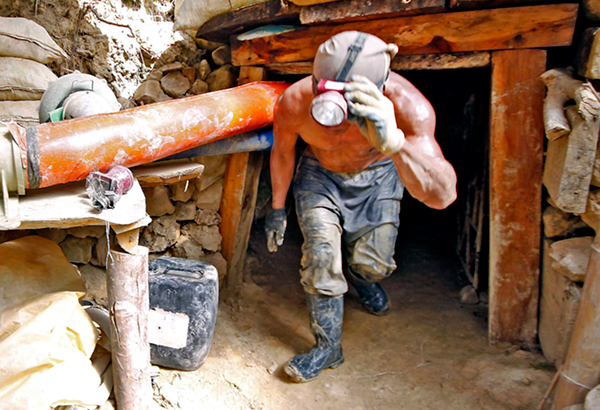Commentary: Ensuring mining industry's role in recovery

Over a year into the pandemic, we are still under lockdown, over 12 million Filipinos remain jobless and public debt has grown to 10.99 trillion pesos. Moreover, the economy has contracted by 9.6% and the country's growth projections have been revised downwards.
The past year has also highlighted the instrumental role of the private sector in responding to and recovering from the pandemic. It has also made us reassess economic drivers and presented us with a chance to build back better.
One of the economic drivers the Philippine government is revisiting is the mining industry. Earlier this year, President Rodrigo Duterte signed Executive Order 130, lifting the ban on new mining agreements and seen to boost government revenue and help the economy recover from the pandemic.
However, the revival of the mining industry has also rekindled concern over environmental challenges often associated with extractive industries such as land degradation, the use of dangerous chemicals; the loss of biodiversity; and pollution from poorly disposed waste.
These concerns, however, set up a false dichotomy that the decision to revive the mining industry comes down to a choice between economic growth and environmental degradation. But this just isn't the case.
Undoubtedly, these unregulated, often illegal, operations around our country have shaped public perception of the Philippine mining industry. Usually, it's these unregulated operations that skirt environmental rules and cause the most damage.
For instance, last year, illegal mining and logging activities in Cagayan Valley were investigated, causing landslides, river siltation and catastrophic flooding in the region. Many small-scale miners also continue to use highly toxic mercury for gold mining operations.
Mercury acts like a "magnet" that extracts gold from the soil, but it is also bad for the miner's health and can contaminate and pollute nearby local communities' soil and water sources.
However, not all mining in the Philippines is bad. Many of the country's formal large-scale mining operations practice "responsible mining." Responsible mining is defined as mining that involves and respects all stakeholders, minimizes and takes account of its environmental impact, and prioritizes a fair division of economic and financial benefits.
First, they do not use hazardous chemicals like mercury in their operations. Second, these companies also implement and fund programs for reforestation, rehabilitation, air, land and soil monitoring and treatment, and waste management to ensure that the impacts of their activities are mitigated and that measures are in place to assure compliance with social and environmental management standards, regulations, and laws.
Furthermore, these companies also have strong corporate social responsibility programs that positively impact their host communities. In addition to creating jobs, these mining operations improve the quality of life of their host communities by providing health and sanitation facilities, schools, community halls, and electric and water facilities.
In fact, when the pandemic came along, the mining industry was part of the private sector-led push to respond to these new challenges.
For instance, many mining companies realigned their Social Development and Management Program (SDMP) funds and spent over P380 million in 2020 for COVID-19 responses. In addition, mining firms also provided isolation units for communities and food and logistics support. Because of this, over 1.1 million households and nearly 300,000 front liners all over the country were supported.
In Benguet, for instance, Philex Mining Corp. (PMC) supported the barangays in purchasing medicines to augment the government's Social Amelioration Program and cash assistance to families in Barangay Camp 3, Tuba. In addition, PPEs were also donated to at least five hospitals in Baguio and 3 in Benguet.
In Surigao del Norte, PMC provided funds for fuel used by barangay emergency vehicles in hauling goods and ferrying medical patients and frontliners to and from Baguio. Meanwhile, Silangan Mindanao Mining Co. Inc. in Surigao lent its stockyard in Barangay Macalaya as a temporary isolation facility. They also distributed surgical PPEs to the Caraga Regional Hospital in Surigao City, the Provincial Hospital in Placer, and the Municipal Health Offices of Placer, Tagana-an, and Mainit.
Yet another example is OceanaGold Phils. Inc. that, despite being non-operational since July 2019, distributed medicines, PPEs and food supplies to 19,000 households in Nueva Vizcaya and Quirino.
In 2021, mining firms have also been allowed by the MGB to realign their SDMP and Safety and Health Program funds to procure COVID-19 vaccines for their host and neighboring communities and employees. This will boost the national and local government's COVID-19 vaccination programs and ensure that all Filipinos, especially those in remote and isolated areas, have access to vaccines.
These mining companies' proper environmental management and social responsibility demonstrate that responsible mining is possible in the Philippines. However, the industry must operate beyond mere compliance with local environmental standards to sway the public's perception.
Several local mining companies have already subscribed to the Extractive Industries Transparency Initiative (EITI), a multi-stakeholder initiative and recognized global standard that promotes the open, accountable management and good governance of oil, gas, and mineral resources. As EITI members, companies are audited for their compliance with environmental regulations and rules on social expenditures.
However, in the spirit of building back better, the Philippine mining industry should also widen the adoption of the Towards Sustainable Mining (TSM) initiative. TSM sets strict environmental, social, health, safety, innovation and human rights standards for mining operators to follow. The process also involves a yearly self-assessment by mining companies and an external verification process.
The last year has made the government realize the mining industry's economic value. It has also allowed responsible mining companies to distinguish themselves from unregulated and illegal operators through their social responsibility and COVID-19 response efforts. However, if the industry wants the industry's revival to last, it must show that it can contribute to the economic recovery while simultaneously operating in the most socially, economically and environmentally responsible way.
Paco Pangalangan is the executive director of think tank Stratbase ADR Institute.
- Latest























